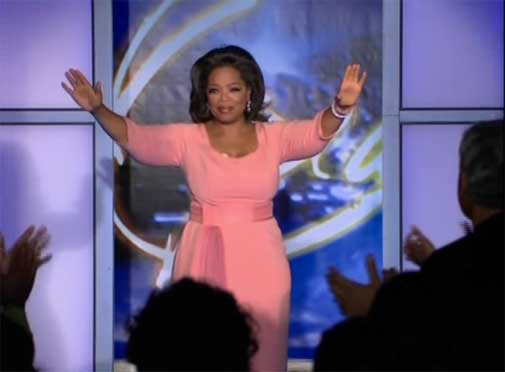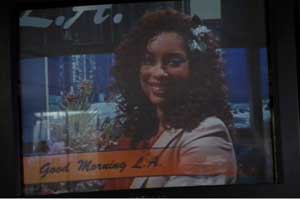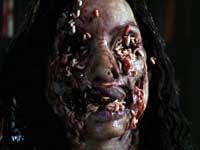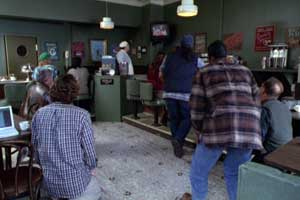
Oprah Winfrey's three-day, three-part TV series finale -- two parts Premature Burial fawning salute, one part sermon on the TV mount -- was a study in celebrity worship at its highest.

For two days, Monday and Tuesday, a parade of A-listers paid homage to Oprah, talking about nothing but her. On Wednesday's final day, Oprah accepted that load, and spent her last hour, with no guests, talking about herself and her audience.
At the end, raising her arms to soak in the adoring applause, she looked like a prophet, a religious figure, absolutely angelic. Yet it also gave me a disturbing sense of deja vu...
As she spoke of empowering the audience, and connecting with them, for 25 years, and as one camera shot after another captured images of her studio audience in thrall, Wednesday's finale suddenly reminded me of an image that, from that moment on, I could not shake.
A confident and attractive black woman, addressing her adoring TV flock in calming, quiet tones. An audience all but worshipping at her feet, accepting and embracing every affirming word. A use of television at its most potent, reaching out, grabbing and mobilizing millions with a single call to action.
I had seen this somewhere on TV before...

Specifically, I had seen it eight years ago, during the fourth season of the TV series Angel, created by Joss Whedon and David Greenwalt as a spinoff of Buffy the Vampire Slayer.
Near the end of the season, in April 2003, Angel presented a disturbing plot line in which a supernatural being -- conceived, quite literally, by other supernaturally imbued characters on the show -- arrived fully grown, looking like an exotic, beautiful black woman whose every look, word and purr soothed and charmed everyone around her.
Played by Gina Torres, who went on to star in Whedon's Firefly, this inspirational figure of worship was given the name of Jasmine. Everyone fell under her spell, but one character -- "Fred," played by Amy Acker -- eventually snapped out of it.

As a result, she, and she alone, could see Jasmine for what she really was: a maggoty, frightening demon intent on controlling all humanity for her own ends, which included sacrificing them for her own sustenance.
Please understand -- I'm not equating Oprah Winfrey with a deadly demon. Especially a maggoty one. But her spell is similar. In one episode, Jasmine decided, quite shrewdly, that the quickest way to make over the planet was to get on television and beam herself and her hypnotic message to millions of viewers at once.

On Angel, Jasmine started on local TV, just the way Oprah had in Chicago. We're shown a scene in which Jasmine appears on local TV for the first time -- and as Acker's unaffected character watches a diner-counter TV in horror, everyone else in the diner is rapt and spellbound.
Next step, if Jasmine isn't stopped: syndication.
Had Jasmine not been bested by the heroes of Angel, who knows where her influence could have spread? National television. Magazines. Book clubs. Even her own cable network.
In real life, Oprah Winfrey's spread has been just as overwhelming, like a one-woman, mass-media tsunami. We can be grateful for her legacy and motivations... but, based on how grandly she said goodbye to one line on her career resume this week, we should all be very, very grateful that, as TV "saviors" go, Oprah Winfrey is a benign force.

But wait a second. Now I'm flashing back on another TV series -- V -- where the charismatic and beautiful woman in charge there, as a visitor totally alien to our planet, arrived with a promise of good works, good deeds and the best of intentions.
And all she wanted to do, among other things, was rule the planet, drain its resources and, just like Jasmine, use humans as an expendable energy resource.
But Oprah Winfrey, as we all know, is no V.
She's O.